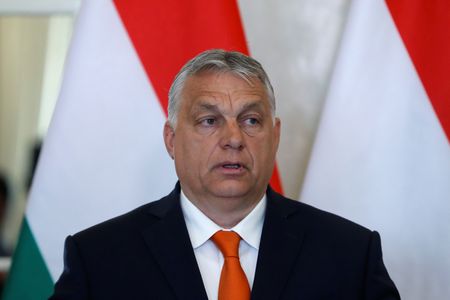BUDAPEST (Reuters) -Hungary is aiming to prevent its economy sliding into recession, Prime Minister Viktor Orban said on Friday after data this week showed the economy contracting in quarterly terms for the first time in more than two years.
Soaring inflation sapped central Europe’s economies in the third quarter, with Hungary nearing a technical recession and Poland, the region’s biggest economy, slowing while avoiding a second quarterly contraction.
Hungary’s economy grew by an annual 4% in the third quarter, based on preliminary unadjusted data, but output dropped by 0.4% from the second quarter, marking the first contraction in quarterly terms since the second quarter of 2020.
“Our goal is to prevent the economy starting to decline. This is a threat for most European Union countries … but we would like to buck this trend,” Orban told public radio in an interview.
Orban said his nationalist government, which is expected to unveil an overhauled 2023 budget next month, would continue to support families and seek to maintain full employment amid a slowdown triggered by the war in neighbouring Ukraine.
In late September, Orban’s government imposed a spending freeze to allow for a deep expenditure review after surging costs of energy imports forced Hungary to seek deferred payments to Russia’s Gazprom for gas supplies.
The budget posted a surplus in September and October, but even so it will post a deficit worth 6.1% of economic output this year, above earlier plans for 4.9%, due to Hungary buying larger amounts of gas to replenish its storage.
Orban said Hungary would continue to rely on Russian gas supplies next year.
(Reporting by Anita Komuves and Gergely Szakacs)

